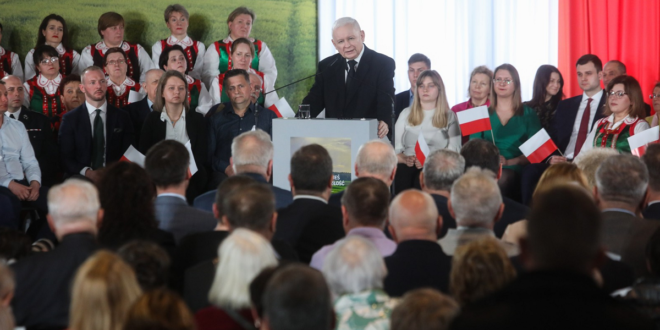By introducing, together with Orbán, a ban on the transport of food from Ukraine, PiS turns its back on Kiev, opens another dispute with the EU and squanders the moral capital that Poland gained last year by helping its attacked neighbor. It’s a good news. For Putin
The really alarming results of opinion polls, showing the troubles of the government and good ratings of the Confederation, must have come to the PiS headquarters, since the government denied the policy of supporting Ukraine.
When grain, which was supposed to pass through Poland on its way to starving Africa, remained in our country, leading to the collapse of the profitability of agricultural production, PiS decided to run forward. First, there was the resignation of the Minister of Agriculture, Henryk Kowalczyk, which, however, apparently did not calm down the mood in the countryside. On Saturday, at a party convention devoted to agriculture, Jarosław Kaczyński announced that the government had introduced a ban on food imports from Ukraine.
PiS wants to show farmers how much it cares about them. But this decision is disastrous for the credibility of our country. First, it leads to an unprecedented conflict with the European Union. Lawyers may argue whether and to what extent the judiciary is mentioned in the EU treaties, but the issue of free trade is obvious – it is a competence that Poland has given to Brussels. Hence the immediate reaction of the head of the European Commission Ursula von der Leyen. It is possible that in some time Brussels will force the government in Warsaw to withdraw the ban, and then the PiS president will say that he wanted to “protect” Polish agriculture, but the disgusting Brussels did not allow him to do so. The spiral of reluctance towards the EU will intensify, and the tension between Warsaw and other EU capitals will grow.
Secondly, PiS’s decision hits Ukrainian agriculture. The export of his products was to be a source of income during the extremely costly war with Russia. Farmers from Ukraine, but also the local economy will pay for the inefficiency of the Polish government.
Finally, the PiS movement may end the period of good press that Poland enjoyed in the world because of the help given to Ukraine. It was a source of national pride, but also the so-called the soft power of our country, which was discounted by the politicians of the ruling party during their foreign visits. Now Poland is sending a signal that within the logic of the election campaign it is able to do anything, even stab a knife in the back of fighting Ukraine.
So far, PiS has complained that the EU has not done enough to help Poles who helped Ukraine. Now he will complain that the EU, helping Ukraine, harms Polish agriculture. Any flip is possible to save the electorate’s support before the election.
And who benefits from the fact that Poland enters into a sharper conflict with Brussels? Who benefits from the weakening of the Ukrainian economy? Who gains from a blow to Poland’s reputation as a faithful friend and advocate of Ukraine, who supported it in the fight against Russia?
 Eurasia Press & News
Eurasia Press & News




